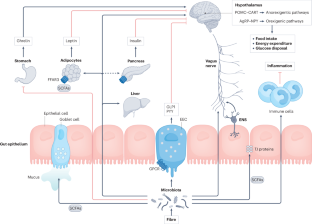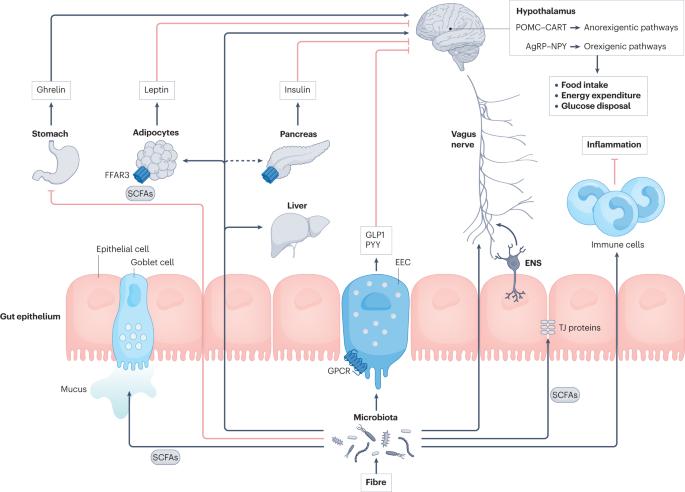膳食纤维对代谢健康和肥胖症的影响。
IF 45.9
1区 医学
Q1 GASTROENTEROLOGY & HEPATOLOGY
引用次数: 0
摘要
肥胖症和代谢综合征在全球范围内日益流行。体重通过荷尔蒙、神经和新陈代谢途径之间复杂的相互作用进行调节,并受到多种环境因素的影响。能量摄入和消耗之间的不平衡可能是由多种因素造成的,包括进食行为的改变、异常饱腹感和饱足感以及低能量消耗。肠道微生物群通过对粘膜和全身免疫系统、激素和神经系统产生影响的各种机制,对能量平衡的各个方面产生深远影响。膳食纤维对新陈代谢和肥胖症的益处已通过机理研究和临床试验得到证实,但对于如何最好地利用不同纤维来控制肥胖症,仍存在许多问题。在本综述中,我们将讨论不同纤维的理化特性、目前关于纤维和肠道微生物群如何相互作用以调节体重平衡的研究结果,以及将膳食纤维作为一种补充策略的相关知识缺口。利用基线微生物群和临床特征来预测个体对纤维补充剂反应的精准医学方法代表了一种新的范式,在提高体重管理疗效方面具有巨大潜力,但在全面实施这些方法之前仍存在许多挑战。本文章由计算机程序翻译,如有差异,请以英文原文为准。


Effects of dietary fibre on metabolic health and obesity
Obesity and metabolic syndrome represent a growing epidemic worldwide. Body weight is regulated through complex interactions between hormonal, neural and metabolic pathways and is influenced by numerous environmental factors. Imbalances between energy intake and expenditure can occur due to several factors, including alterations in eating behaviours, abnormal satiation and satiety, and low energy expenditure. The gut microbiota profoundly affects all aspects of energy homeostasis through diverse mechanisms involving effects on mucosal and systemic immune, hormonal and neural systems. The benefits of dietary fibre on metabolism and obesity have been demonstrated through mechanistic studies and clinical trials, but many questions remain as to how different fibres are best utilized in managing obesity. In this Review, we discuss the physiochemical properties of different fibres, current findings on how fibre and the gut microbiota interact to regulate body weight homeostasis, and knowledge gaps related to using dietary fibres as a complementary strategy. Precision medicine approaches that utilize baseline microbiota and clinical characteristics to predict individual responses to fibre supplementation represent a new paradigm with great potential to enhance weight management efficacy, but many challenges remain before these approaches can be fully implemented. Obesity and metabolic syndrome are two complex and multifactorial conditions. This Review provides a comprehensive overview of dietary fibres, discussing physiochemical properties, microbiota interactions and therapeutic interventions for body weight and insulin resistance regulation.
求助全文
通过发布文献求助,成功后即可免费获取论文全文。
去求助
来源期刊
CiteScore
52.30
自引率
0.60%
发文量
147
审稿时长
6-12 weeks
期刊介绍:
Nature Reviews Gastroenterology & Hepatology aims to serve as the leading resource for Reviews and commentaries within the scientific and medical communities it caters to. The journal strives to maintain authority, accessibility, and clarity in its published articles, which are complemented by easily understandable figures, tables, and other display items. Dedicated to providing exceptional service to authors, referees, and readers, the editorial team works diligently to maximize the usefulness and impact of each publication.
The journal encompasses a wide range of content types, including Research Highlights, News & Views, Comments, Reviews, Perspectives, and Consensus Statements, all pertinent to gastroenterologists and hepatologists. With its broad scope, Nature Reviews Gastroenterology & Hepatology ensures that its articles reach a diverse audience, aiming for the widest possible dissemination of valuable information.
Nature Reviews Gastroenterology & Hepatology is part of the Nature Reviews portfolio of journals.

 求助内容:
求助内容: 应助结果提醒方式:
应助结果提醒方式:


